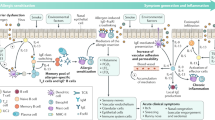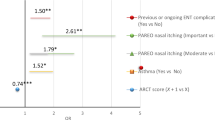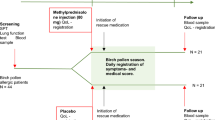Abstract
Rhinitis is a common problem in primary care which is often managed sub-optimally. It causes considerable morbidity and has been shown to have a detrimental impact on people's ability to concentrate at school and at work. Rhinitis and asthma often present together, and symptomatic rhinitis can be associated with poor asthma control and increased risk of exacerbations. There is therefore a clear need to recognise and treat rhinitis according to guideline recommendations.
This article is a primary care summary of the British Society for Allergy & Clinical Immunology (BSACI) Standards of Care Committee guideline on the management of rhinitis, written by a multi-disciplinary group of clinicians. It takes into account the time restrictions on assessment and the tests and equipment available in primary care, as well as the need for practical, clear and intuitive strategies for investigation and management. It recommends a stepwise approach to treatment, and highlights the relevance of less frequently prescribed treatments, including nasal douching leukotriene receptor antagonists and anticholinergics. Red flag symptoms are identified, together with indicators for referral. As with many other long term conditions, good communication between primary and secondary care in terms of timely and appropriate referral is a key factor for success.
Similar content being viewed by others
Article PDF
Author information
Authors and Affiliations
Corresponding author
Ethics declarations
Competing interests
EA is a advisory board/consultant for Schering Plough.
JW has no conflicts of interest.
GS is a consultant / advisory board member for ALK, Britannia Pharmaceuticals, CMP Therapeutics, Groupo Uriach, GSK, Merck, Sanofi- Aventis, Schering Plough, UCB. Has received research funds from ALK, GSK, UCB, Schering Plough and has given talks for ALK, GSK, Merck, Schering Plough, UCB and has co- written articles for Schering Plough and GSK.
Rights and permissions
About this article
Cite this article
Angier, E., Willington, J., Scadding, G. et al. Management of allergic and non-allergic rhinitis: a primary care summary of the BSACI guideline. Prim Care Respir J 19, 217–222 (2010). https://doi.org/10.4104/pcrj.2010.00044
Received:
Revised:
Accepted:
Published:
Issue Date:
DOI: https://doi.org/10.4104/pcrj.2010.00044
This article is cited by
-
Non-allergic rhinitis and associated risk factors among the elderly in communities close to gold mine dumps in Gauteng and North West provinces in South Africa: a cross-sectional study
International Archives of Occupational and Environmental Health (2020)
-
Efficacy of allergen-blocker mechanical barrier gel on symptoms and quality of life in patients with allergic rhinitis
European Archives of Oto-Rhino-Laryngology (2019)
-
An algorithm recommendation for the pharmacological management of allergic rhinitis in the UK: a consensus statement from an expert panel
npj Primary Care Respiratory Medicine (2017)
-
Does allergic rhinitis affect communication skills in young adults?
European Archives of Oto-Rhino-Laryngology (2016)
-
Homeopathy for allergic rhinitis: protocol for a systematic review
Systematic Reviews (2014)



